DACIA LODGY 2022 Owner's Manual
Manufacturer: DACIA, Model Year: 2022, Model line: LODGY, Model: DACIA LODGY 2022Pages: 220, PDF Size: 2.62 MB
Page 21 of 220
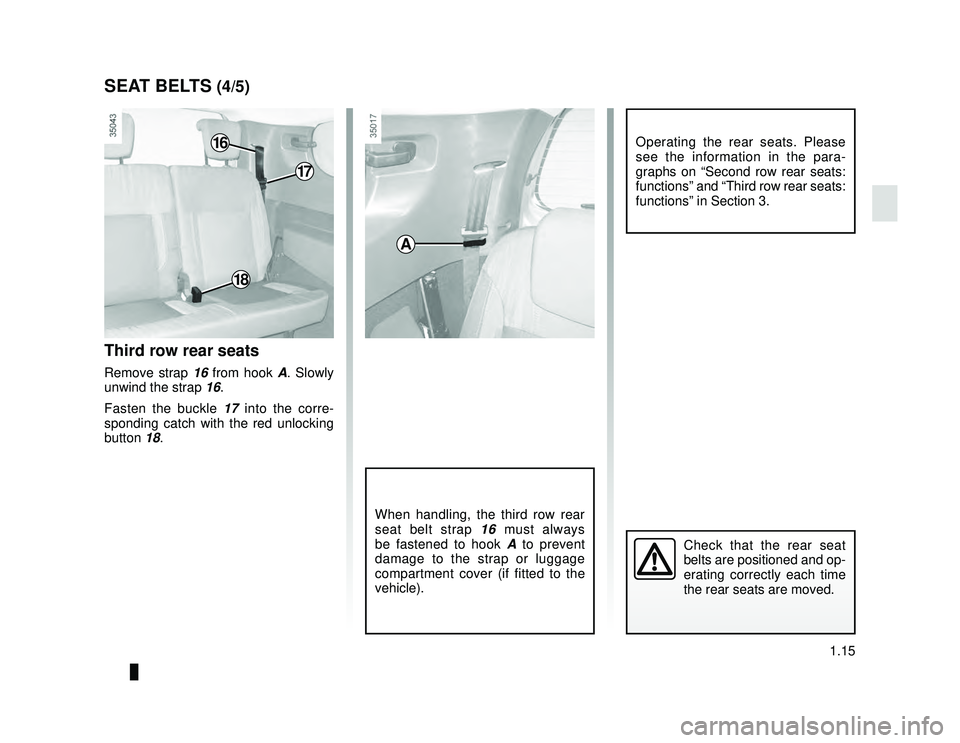
JauneNoir Noir texte
1.15
ENG_UD24405_1
Ceintures de sécurité (X92 - Renault)
ENG_NU_975-6_X92_Dacia_1
SEAT BELTS (4/5)
When handling, the third row rear
seat belt strap 16 must always
be fastened to hook A to prevent
damage to the strap or luggage
compartment cover (if fitted to the
vehicle).
Check that the rear seat
belts are positioned and op-
erating correctly each time
the rear seats are moved.
Operating the rear seats. Please
see the information in the para-
graphs on “Second row rear seats:
functions” and “Third row rear seats:
functions” in Section 3.
A
16
17
18
Third row rear seats
Remove strap 16 from hook A. Slowly
unwind the strap 16.
Fasten the buckle 17 into the corre-
sponding catch with the red unlocking
button 18.
Page 22 of 220
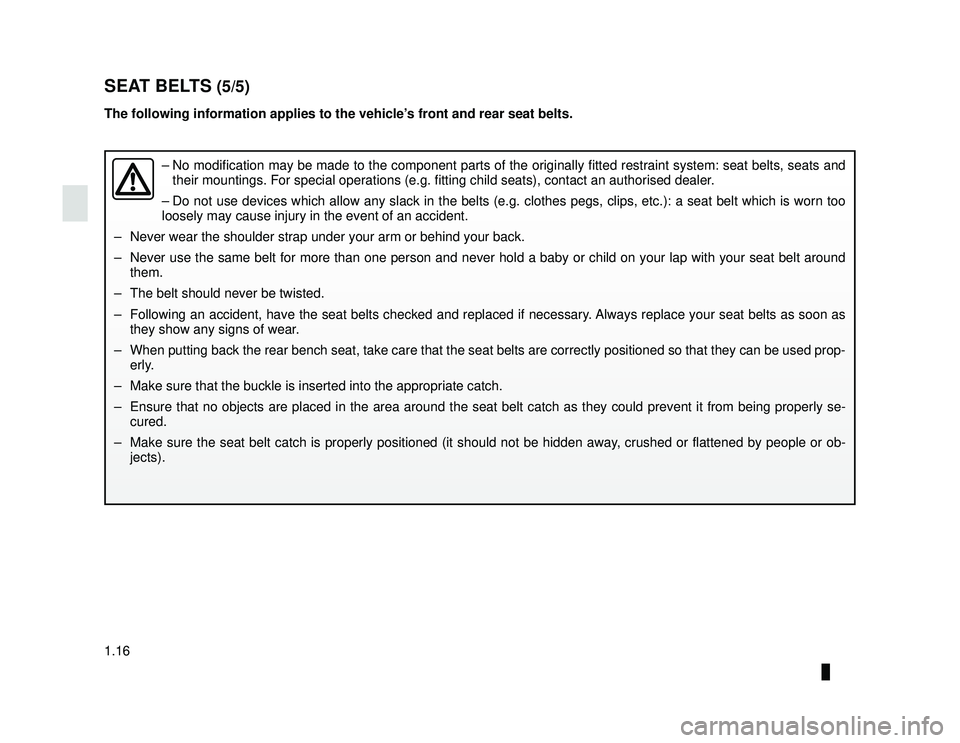
JauneNoir Noir texte
1.16
ENG_UD24405_1
Ceintures de sécurité (X92 - Renault)
ENG_NU_975-6_X92_Dacia_1
SEAT BELTS (5/5)
The following information applies to the vehicle’s front and rear seat belts.
– No modification may be made to the component parts of the originally fit\
ted restraint system: seat belts, seats and
their mountings. For special operations (e.g. fitting child seats), co\
ntact an authorised dealer.
– Do not use devices which allow any slack in the belts (e.g. clothes pegs, clips, etc.): a seat belt which is worn too
loosely may cause injury in the event of an accident.
– Never wear the shoulder strap under your arm or behind your back.
– Never use the same belt for more than one person and never hold a baby o\
r child on your lap with your seat belt around them.
– The belt should never be twisted.
– Following an accident, have the seat belts checked and replaced if neces\
sary. Always replace your seat belts as soon as they show any signs of wear.
– When putting back the rear bench seat, take care that the seat belts are correctly positioned so that they can be used prop- erly.
– Make sure that the buckle is inserted into the appropriate catch.
– Ensure that no objects are placed in the area around the seat belt catch\
as they could prevent it from being properly se- cured.
– Make sure the seat belt catch is properly positioned (it should not be \
hidden away, crushed or flattened by people or ob- jects).
Page 23 of 220
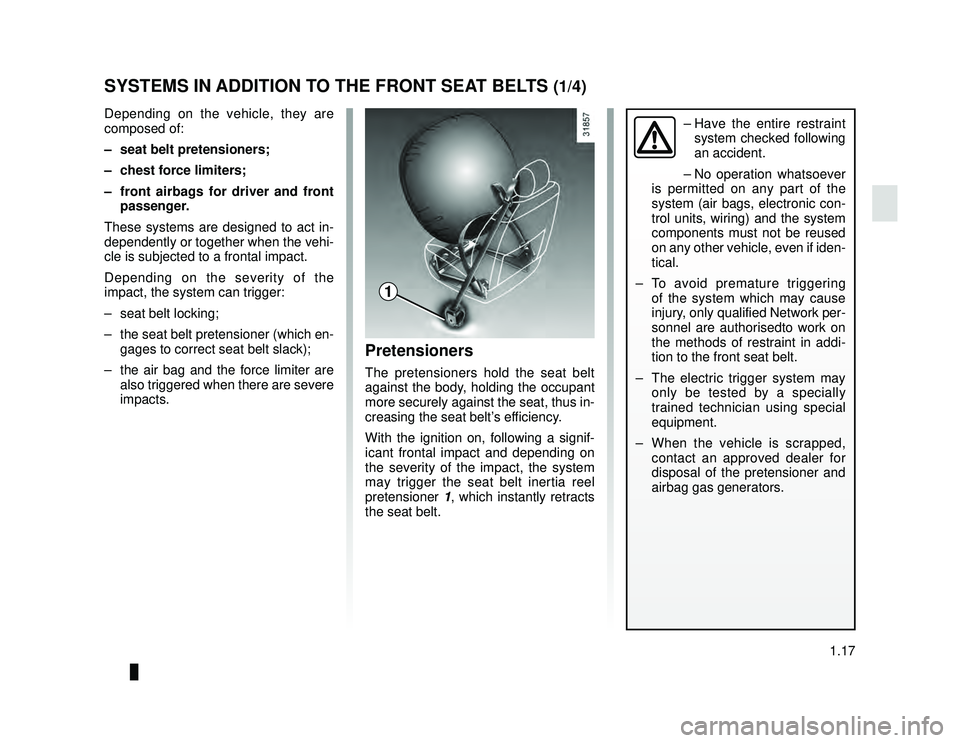
JauneNoir Noir texte
1.17
ENG_UD24406_1
Dispositifs complémentaires à la ceinture avant (X92 - Renault)
ENG_NU_975-6_X92_Dacia_1
SYSTEMS IN ADDITION TO THE FRONT SEAT BELTS (1/4)
Depending on the vehicle, they are
composed of:
– seat belt pretensioners;
– chest force limiters;
– front airbags for driver and front
passenger.
These systems are designed to act in-
dependently or together when the vehi-
cle is subjected to a frontal impact.
Depending on the severity of the
impact, the system can trigger:
– seat belt locking;
– the seat belt pretensioner (which en- gages to correct seat belt slack);
– the air bag and the force limiter are also triggered when there are severe
impacts.– Have the entire restraint
system checked following
an accident.
– No operation whatsoever
is permitted on any part of the
system (air bags, electronic con-
trol units, wiring) and the system
components must not be reused
on any other vehicle, even if iden-
tical.
– To avoid premature triggering of the system which may cause
injury, only qualified Network per-
sonnel are authorisedto work on
the methods of restraint in addi-
tion to the front seat belt.
– The electric trigger system may only be tested by a specially
trained technician using special
equipment.
– When the vehicle is scrapped, contact an approved dealer for
disposal of the pretensioner and
airbag gas generators.
Pretensioners
The pretensioners hold the seat belt
against the body, holding the occupant
more securely against the seat, thus in-
creasing the seat belt’s efficiency.
With the ignition on, following a signif-
icant frontal impact and depending on
the severity of the impact, the system
may trigger the seat belt inertia reel
pretensioner 1, which instantly retracts
the seat belt.
1
Page 24 of 220
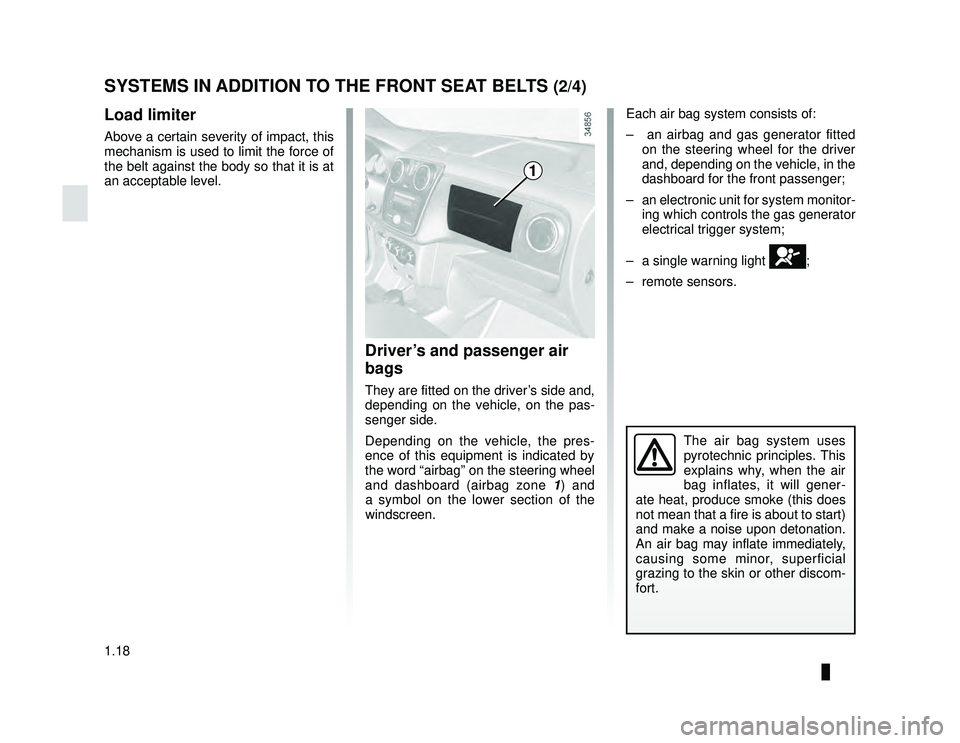
JauneNoir Noir texte
1.18
ENG_UD24406_1
Dispositifs complémentaires à la ceinture avant (X92 - Renault)
ENG_NU_975-6_X92_Dacia_1
SYSTEMS IN ADDITION TO THE FRONT SEAT BELTS (2/4)
Driver’s and passenger air
bags
They are fitted on the driver’s side and,
depending on the vehicle, on the pas-
senger side.
Depending on the vehicle, the pres-
ence of this equipment is indicated by
the word “airbag” on the steering wheel
and dashboard (airbag zone 1) and
a symbol on the lower section of the
windscreen.
Each air bag system consists of:
– an airbag and gas generator fitted on the steering wheel for the driver
and, depending on the vehicle, in the
dashboard for the front passenger;
– an electronic unit for system monitor- ing which controls the gas generator
electrical trigger system;
– a single warning light
å;
– remote sensors.
Load limiter
Above a certain severity of impact, this
mechanism is used to limit the force of
the belt against the body so that it is at
an acceptable level.
The air bag system uses
pyrotechnic principles. This
explains why, when the air
bag inflates, it will gener-
ate heat, produce smoke (this does
not mean that a fire is about to start)
and make a noise upon detonation.
An air bag may inflate immediately,
causing some minor, superficial
grazing to the skin or other discom-
fort.
1
Page 25 of 220
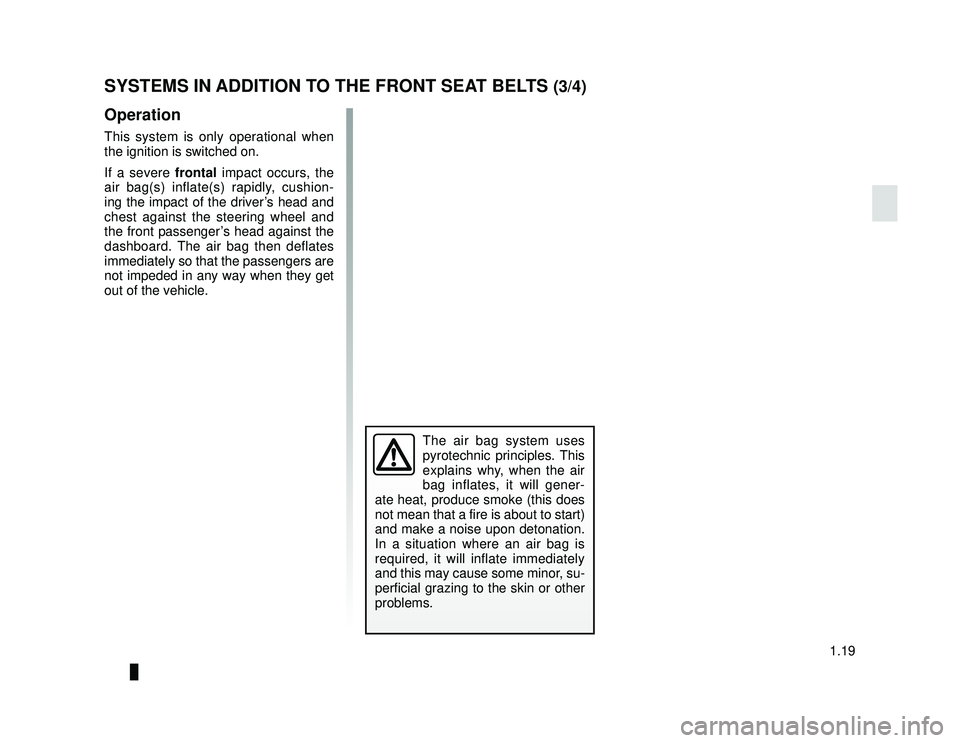
JauneNoir Noir texte
1.19
ENG_UD24406_1
Dispositifs complémentaires à la ceinture avant (X92 - Renault)
ENG_NU_975-6_X92_Dacia_1
SYSTEMS IN ADDITION TO THE FRONT SEAT BELTS (3/4)
Operation
This system is only operational when
the ignition is switched on.
If a severe frontal impact occurs, the
air bag(s) inflate(s) rapidly, cushion-
ing the impact of the driver’s head and
chest against the steering wheel and
the front passenger’s head against the
dashboard. The air bag then deflates
immediately so that the passengers are
not impeded in any way when they get
out of the vehicle.
The air bag system uses
pyrotechnic principles. This
explains why, when the air
bag inflates, it will gener-
ate heat, produce smoke (this does
not mean that a fire is about to start)
and make a noise upon detonation.
In a situation where an air bag is
required, it will inflate immediately
and this may cause some minor, su-
perficial grazing to the skin or other
problems.
Page 26 of 220
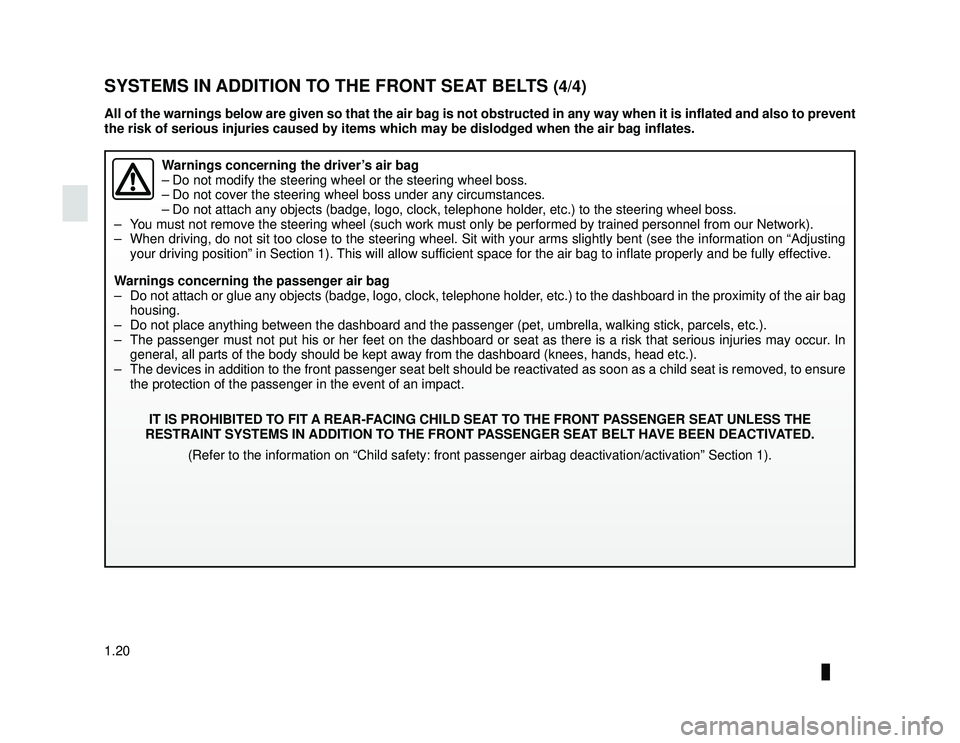
JauneNoir Noir texte
1.20
ENG_UD24406_1
Dispositifs complémentaires à la ceinture avant (X92 - Renault)
ENG_NU_975-6_X92_Dacia_1
SYSTEMS IN ADDITION TO THE FRONT SEAT BELTS (4/4)
All of the warnings below are given so that the air bag is not obstructed in any way when it\
is inflated and also to prevent
the risk of serious injuries caused by items which may be dislodged when\
the air bag inflates.
Warnings concerning the driver’s air bag
– Do not modify the steering wheel or the steering wheel boss.
– Do not cover the steering wheel boss under any circumstances.
– Do not attach any objects (badge, logo, clock, telephone holder, etc.) to the steering wheel boss.
– You must not remove the steering wheel (such work must only be performed\
by trained personnel from our Network).
– When driving, do not sit too close to the steering wheel. Sit with your \
arms slightly bent (see the information on “Adjusting
your driving position” in Section 1). This will allow sufficient space for the air bag to inflate properly and be fully effective.
Warnings concerning the passenger air bag
– Do not attach or glue any objects (badge, logo, clock, telephone holder, etc.) to the dashboard in the proximity of the air b ag
housing.
– Do not place anything between the dashboard and the passenger (pet, umb\
rella, walking stick, parcels, etc.).
– The passenger must not put his or her feet on the dashboard or seat as t\
here is a risk that serious injuries may occur. In general, all parts of the body should be kept away from the dashboard (\
knees, hands, head etc.).
– The devices in addition to the front passenger seat belt should be reactivated as soon as a child seat is removed, to ensure the protection of the passenger in the event of an impact.
IT IS PROHIBITED TO FIT A REAR-FACING CHILD SEAT TO THE FRONT PASSENGER SEAT UNLESS THE
RESTRAINT SYSTEMS IN ADDITION TO THE FRONT PASSENGER SEAT BELT HAVE BEEN DEACTIVATED.
(Refer to the information on “Child safety: front passenger airbag d\
eactivation/activation” Section 1).
Page 27 of 220
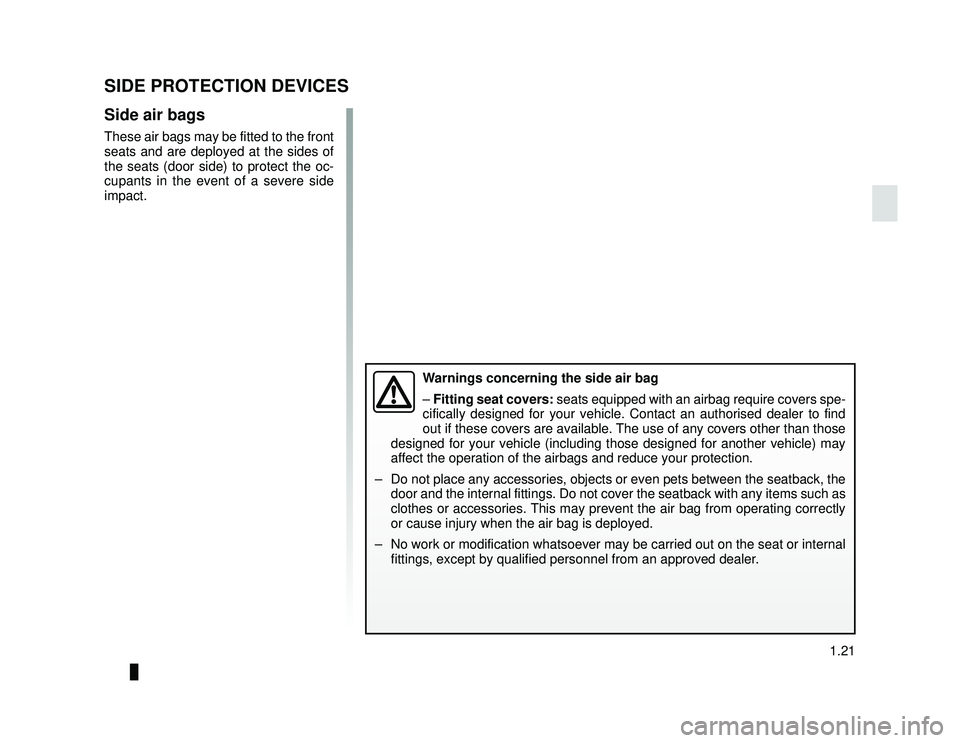
JauneNoir Noir texte
1.21
ENG_UD24407_1
Dispositifs de protection latérale (X92 - Renault)
ENG_NU_975-6_X92_Dacia_1
SIDE PROTECTION DEVICES
Side air bags
These air bags may be fitted to the front
seats and are deployed at the sides of
the seats (door side) to protect the oc-
cupants in the event of a severe side
impact.
Warnings concerning the side air bag
– Fitting seat covers: seats equipped with an airbag require covers spe-
cifically designed for your vehicle. Contact an authorised dealer to fin\
d
out if these covers are available. The use of any covers other than those
designed for your vehicle (including those designed for another vehicle\
) may
affect the operation of the airbags and reduce your protection.
– Do not place any accessories, objects or even pets between the seatback,\
the door and the internal fittings. Do not cover the seatback with any items\
such as
clothes or accessories. This may prevent the air bag from operating correctly
or cause injury when the air bag is deployed.
– No work or modification whatsoever may be carried out on the seat or internal fittings, except by qualified personnel from an approved dealer.
Page 28 of 220
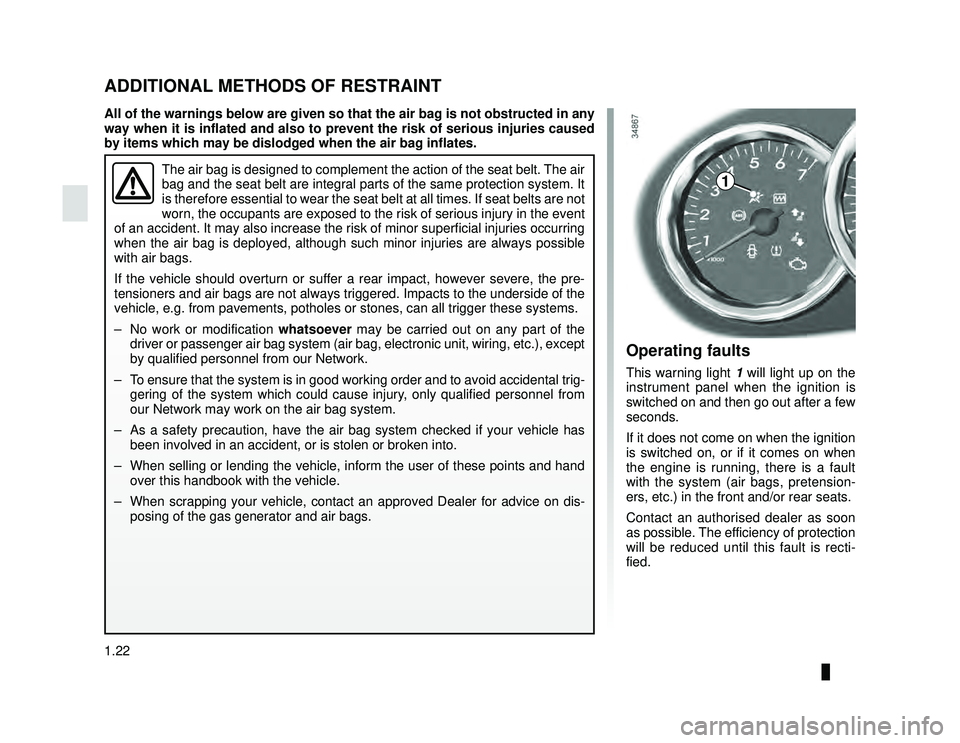
JauneNoir Noir texte
1.22
ENG_UD24408_1
Dispositifs de retenue complémentaire (X92 - Renault)
ENG_NU_975-6_X92_Dacia_1
ADDITIONAL METHODS OF RESTRAINT
All of the warnings below are given so that the air bag is not obstructe\
d in any
way when it is inflated and also to prevent the risk of serious injuries caused
by items which may be dislodged when the air bag inflates.
The air bag is designed to complement the action of the seat belt. The air
bag and the seat belt are integral parts of the same protection system. It
is therefore essential to wear the seat belt at all times. If seat belts\
are not
worn, the occupants are exposed to the risk of serious injury in the event
of an accident. It may also increase the risk of minor superficial injur\
ies occurring
when the air bag is deployed, although such minor injuries are always possible
with air bags.
If the vehicle should overturn or suffer a rear impact, however severe, the pre-
tensioners and air bags are not always triggered. Impacts to the undersi\
de of the
vehicle, e.g. from pavements, potholes or stones, can all trigger these \
systems.
– No work or modification whatsoever may be carried out on any part of the
driver or passenger air bag system (air bag, electronic unit, wiring, etc.), except
by qualified personnel from our Network.
– To ensure that the system is in good working order and to avoid accidenta\
l trig- gering of the system which could cause injury, only qualified personnel from
our Network may work on the air bag system.
– As a safety precaution, have the air bag system checked if your vehicle \
has been involved in an accident, or is stolen or broken into.
– When selling or lending the vehicle, inform the user of these points and\
hand over this handbook with the vehicle.
– When scrapping your vehicle, contact an approved Dealer for advice on di\
s- posing of the gas generator and air bags.
Operating faults
This warning light 1 will light up on the
instrument panel when the ignition is
switched on and then go out after a few
seconds.
If it does not come on when the ignition
is switched on, or if it comes on when
the engine is running, there is a fault
with the system (air bags, pretension-
ers, etc.) in the front and/or rear seats.
Contact an authorised dealer as soon
as possible. The efficiency of protection
will be reduced until this fault is recti-
fied.
1
Page 29 of 220
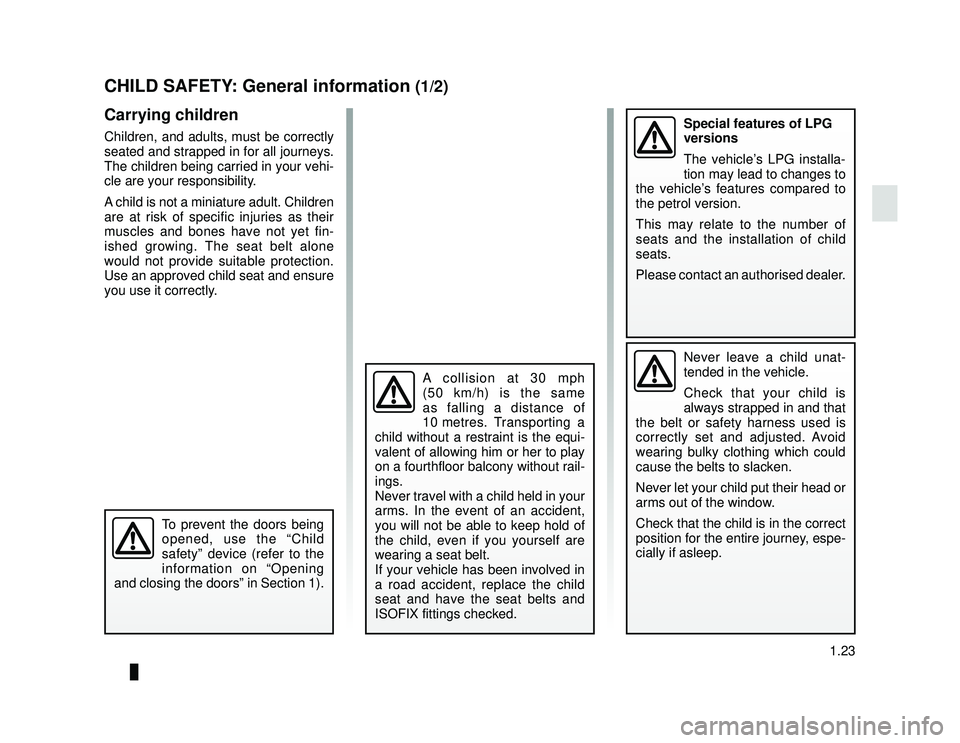
JauneNoir Noir texte
1.23
ENG_UD34832_3
Sécurite enfants : généralités (X67 - X92 - Renault)
ENG_NU_975-6_X92_Dacia_1
CHILD SAFETY: General information (1/2)
Carrying children
Children, and adults, must be correctly
seated and strapped in for all journeys.
The children being carried in your vehi-
cle are your responsibility.
A child is not a miniature adult. Children
are at risk of specific injuries as their
muscles and bones have not yet fin-
ished growing. The seat belt alone
would not provide suitable protection.
Use an approved child seat and ensure
you use it correctly.
A collision at 30 mph
(50 km/h) is the same
as falling a distance of
10 metres. Transporting a
child without a restraint is the equi-
valent of allowing him or her to play
on a fourthfloor balcony without rail-
ings.
Never travel with a child held in your
arms. In the event of an accident,
you will not be able to keep hold of
the child, even if you yourself are
wearing a seat belt.
If your vehicle has been involved in
a road accident, replace the child
seat and have the seat belts and
ISOFIX fittings checked.
Never leave a child unat-
tended in the vehicle.
Check that your child is
always strapped in and that
the belt or safety harness used is
correctly set and adjusted. Avoid
wearing bulky clothing which could
cause the belts to slacken.
Never let your child put their head or
arms out of the window.
Check that the child is in the correct
position for the entire journey, espe-
cially if asleep.
To prevent the doors being
opened, use the “Child
safety” device (refer to the
information on “Opening
and closing the doors” in Section 1).
Special features of LPG
versions
The vehicle’s LPG installa-
tion may lead to changes to
the vehicle’s features compared to
the petrol version.
This may relate to the number of
seats and the installation of child
seats.
Please contact an authorised dealer.
Page 30 of 220
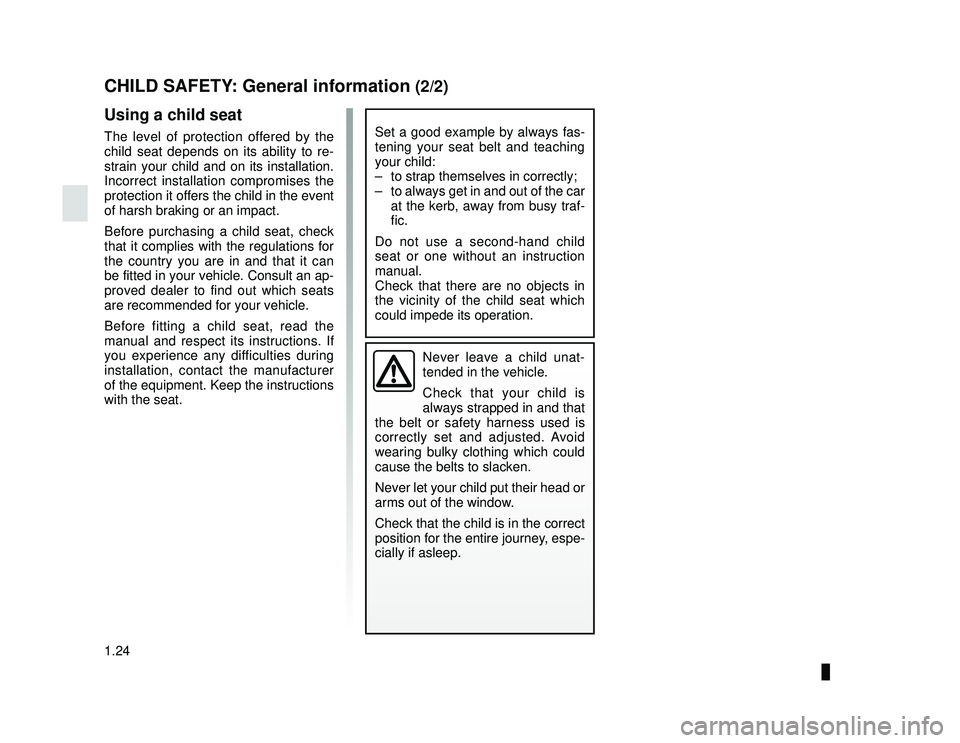
JauneNoir Noir texte
1.24
ENG_UD34832_3
Sécurite enfants : généralités (X67 - X92 - Renault)
ENG_NU_975-6_X92_Dacia_1
CHILD SAFETY: General information (2/2)
Using a child seat
The level of protection offered by the
child seat depends on its ability to re-
strain your child and on its installation.
Incorrect installation compromises the
protection it offers the child in the event
of harsh braking or an impact.
Before purchasing a child seat, check
that it complies with the regulations for
the country you are in and that it can
be fitted in your vehicle. Consult an ap-
proved dealer to find out which seats
are recommended for your vehicle.
Before fitting a child seat, read the
manual and respect its instructions. If
you experience any difficulties during
installation, contact the manufacturer
of the equipment. Keep the instructions
with the seat.Set a good example by always fas-
tening your seat belt and teaching
your child:
– to strap themselves in correctly;
– to always get in and out of the car
at the kerb, away from busy traf-
fic.
Do not use a second-hand child
seat or one without an instruction
manual.
Check that there are no objects in
the vicinity of the child seat which
could impede its operation.
Never leave a child unat-
tended in the vehicle.
Check that your child is
always strapped in and that
the belt or safety harness used is
correctly set and adjusted. Avoid
wearing bulky clothing which could
cause the belts to slacken.
Never let your child put their head or
arms out of the window.
Check that the child is in the correct
position for the entire journey, espe-
cially if asleep.